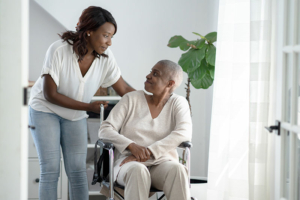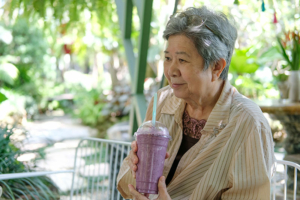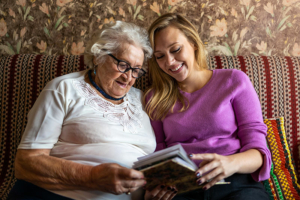What Is a Plan of Care and Why Is It So Important?

If you’re wondering, “What is a plan of care?” we have the important details you need.
You have just started exploring in-home care choices for a loved one, and you’re becoming somewhat overwhelmed. There are countless options to consider, and many new and unfamiliar terms to understand. Take, for example, the plan of care. What is a plan of care, and is it necessary? It may seem like just another piece of jargon in a sea of perplexing terms, but it’s actually one of the most important aspects of senior care services. Here’s why:
Personalized Care Coordination
A care plan isn’t only a document; it is a tailored blueprint designed to meet an individual’s distinct needs and preferences. This plan makes certain that all facets of care, from day-to-day routines to the person’s interests and hobbies, are integrated to make life more comfortable, more enriching, and safer. It helps avoid generalizations in care, concentrating instead on providing what is most advantageous for the person’s health and happiness. This proactive approach supports not just physical health but also emotional and social well-being, adjusting seamlessly to evolving conditions.
Transparent Communication
Among the important functions of a plan of care is to foster clear and consistent communication among everyone involved—caregivers, medical professionals, and family members. This document serves as a central point of reference that everybody can turn to, decreasing misunderstandings and making certain everybody is on the same page concerning the care provided. By developing a common framework for responsibilities and expectations, it encourages a collaborative environment that enhances the quality of care.
Ongoing Assessment and Adaptation
A care plan is a living document that changes with a person’s evolving needs. It contains mechanisms for regular assessment and review, making it possible for adjustments as the senior’s preferences or health status change with time. This flexibility is important for accommodating the natural progression of aging along with any unforeseen health problems, making certain the care provided continues to be effective and appropriate. Through continuous reevaluation and monitoring, the plan stays aligned with the person’s current needs, promoting optimal wellbeing outcomes.
At Responsive Home Care, our services always begin with a complimentary in-home consultation and development of a tailored plan of care. This lays the foundation for the services that will be provided, which caregiver or caregivers will perform these services, when they will occur, and other key details the care team will adhere to.
Your engagement in the care planning process offers you a voice in the care a family member receives. It can help you grasp the rationale behind each aspect of the care strategy and reassures you that their health and happiness are prioritized.
Ready to get started on the creation of a customized care plan for an older loved one? Give us a call at 954-486-6440 to set up your in-home meeting today! We are happy to offer our customized senior care services throughout Fort Lauderdale, Hollywood, Lighthouse Point, and throughout Broward County.










 Everyone goes through good days and bad days, and everyone is entitled to negative thinking or irritability every now and then. If you are caring for an older adult who appears to have fallen into a routine of continual negativity and complaining, there could be a reason for it. It’s worthwhile to explore whether or not a health issue may be the culprit for negative mood changes in a senior.
Everyone goes through good days and bad days, and everyone is entitled to negative thinking or irritability every now and then. If you are caring for an older adult who appears to have fallen into a routine of continual negativity and complaining, there could be a reason for it. It’s worthwhile to explore whether or not a health issue may be the culprit for negative mood changes in a senior.